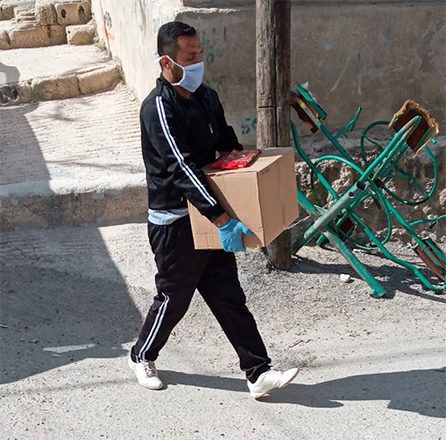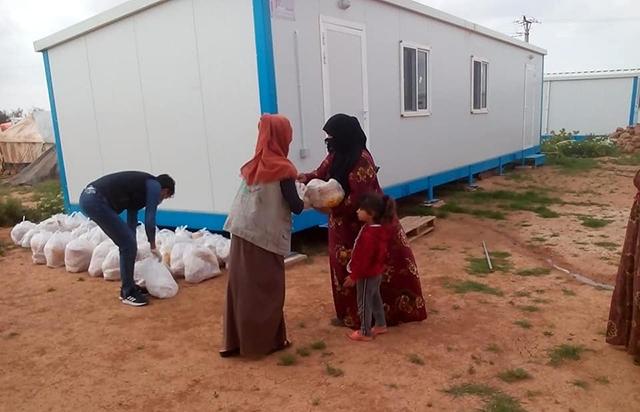You are here
ARDD provides relief aid to over 16,000 families impacted by pandemic across Jordan
By JT - May 31,2020 - Last updated at May 31,2020

The Arab Renaissance for Democracy and Development has coordinated with the Jordanian Hashemite Charity Organisation to provide humanitarian aid according to the needs of local communities (Photo courtesy of ARDD)
AMMAN — The Arab Renaissance for Democracy and Development (ARDD) has been providing support to over 16,000 vulnerable families from refugee and host communities and daily wage workers across the Kingdom in an effort to help them cope with hardships imposed by the COVID-19 pandemic.
According to an ARDD statement, the distribution of aid under ARDD's preparedness plan is consistent with the pandemic response plan of the Jordan NGOs Forum (JONAF), carried out with the support of donors in coordination with the Ministry of Planning, the Ministry of Social Development, the Ministry of Interior and the Jordanian Hashemite Charity Organisation (JHCO), and in partnership with the Jordanian Paramedic Society and more than 20 JONAF community-based organisations and civil society organisations.
In addition to providing continued legal aid services in partnership with UNHCR, ARDD has tailored part of its projects and programmes in line with its preparedness plan to respond to the crisis by identifying four areas to direct its relief efforts: Financial aid, hygiene and sanitation parcel distribution, medical assistance and distribution of food, in addition to the launch of the "Harat Al Ouneh" (supportive neighbourhoods) initiative.
These efforts, implemented throughout Jordan by ARDD in cooperation with JONAF members, are supported by the United Nations Office for the Coordination of Humanitarian Affairs (OCHA), UN Women, the Swiss Agency for Cooperation and Development and Islamic Relief France, according to the statement.
ARDD has coordinated with the Ministry of Interior and the Ministry of Social Development to obtain approvals and present the necessary support for activities, to provide lists of vulnerable families and to distribute aid to beneficiaries “as fairly as possible”.
Coordination was also activated with UNHCR to “ensure that there is no overlap by international and local organisations in the distribution of aid”.
Food distribution
In terms of local humanitarian efforts, ARDD has coordinated with the JHCO to provide humanitarian aid according to the needs of local communities.
ARDD coordinated with the Ministry of Interior to distribute food parcels to 4,000 vulnerable Jordanian and Syrian families in coordination with Irbid Governorate administrators, especially in areas that were isolated during the month of March due to the outbreak of the coronavirus in the governorate. It also cooperated with the Khatwat Amal Association in Irbid to follow up with official authorities on the distribution of food.
In cooperation with the JHCO and JONAF, the Child Care Association and Al Karam Association for Families in Mafraq, ARDD also implemented the "Ramadan Food Parcels" project, funded by the Islamic Relief Organisation-France, which entailed giving out food parcels to 1,350 Jordanian and Syrian refugee families affected by the pandemic.
Financial aid
As for financial support, ARDD cooperated with the Ministry of Social Development, which provided a list of 350 Jordanian families most affected in Irbid, Karak, Zarqa, Amman and Mafraq. ARDD offered cash assistance amounting to JD75 per family, the statement noted.
It also provided financial support to families on JONAF members’ lists of vulnerable families. A total of 1,000 Jordanian and Syrian families benefited from financial aid (JD75 per family) in the five governorates mentioned above.
Towards the end of the month of Ramadan and in preparation for Eid Al Fitr, ARDD dedicated part of the "Enhancing Protection" project aid, funded by the Swiss Agency for Cooperation and Development, to providing emergency relief assistance to 860 Syrian refugees and Jordanian families seriously affected by the virus crisis in Amman, Zarqa, Karak, Mafraq and Irbid.
The aid was delivered in the form of JD50 worth of coupons for each family to shop from the Military Consumer Corporation, in cooperation with JONAF members.
Hygiene and sanitation, medical assistance
ARDD also distributed health and sanitation parcels to 700 most-affected families in addition to supporting the execution of medical check-ups by Jordanian Paramedic Society field teams that visited these families and wrote prescriptions as needed, which were dispensed for free by pharmacies affiliated with hospitals contracting with the society, according to the statement.
The "Children Comprehensive Access to Justice" programme, funded by OCHA, was implemented by ARDD. Under the project, ARDD provided emergency relief assistance to over 1,460 Jordanian and Syrian refugee families affected by the coronavirus crisis in the Amman, Zarqa and Mafraq governorates in coordination with the JHCO and JONAF members, namely the Child Care Association in Mafraq, distributing food and health assistance to most-affected families in Mafraq.
The "Harat Al Ouneh" initiative entails distributing food and sanitation and hygiene products parcels to the Al Amal Association for Social Development in Al Baqaa Palestinian Refugee Camp, Sama Gaza Society in Gaza Camp in Jerash for Palestinian Refugees and Al Harah Society in east Amman.
Through this initiative, ARDD aims to reach out to all governorates in cooperation with local associations, stimulate youth initiatives to “enhance the spirit of solidarity and spread awareness about the crisis” while offering guidance on how to deal with its economic, social and security implications, the statement noted.
Moreover, through the project, a donation was made to Northern Badia Hospital and the Anti-Human Trafficking Unit at the beginning of the crisis consisting of medical materials and sterilisers.
Legal services
Meanwhile, as the UNHCR’s legal partner in Jordan, ARDD has continued to provide legal services to its beneficiaries since the onset of the coronavirus crisis in Jordan in March, in line with its mission to provide legal and social protection to those in need, according to the statement.
Eight phone numbers were designated for protection and legal advice services to cover the Kingdom’s governorates and provide consultations and mediation services to more than 7,000 beneficiaries, which include Jordanians, refugees and residents of Jordanian, Palestinian, Iraqi, Egyptian, Syrian, Yemeni, Sudanese, Somali, Ugandan and Sri Lankan origins, until May 20, 2020.
The services included inquiries and clarifications about the lockdown, all types of movement permits, refugee issues, documentation and consultations on family problems, including divorce, and labour rights in light of instructions issued, in addition to providing legal mediation services to individuals.
Additional efforts
With the support of the Ford Foundation, ARDD also launched a series of regional dialogues and country briefs tackling the social protection situation in Jordan and the Arab region. The dialogue sessions are conducted in cooperation with Senator Sawsan Al Majali, the social development committee chair in the Jordanian Senate, who hosts and moderates this series.
These regional dialogue series aim to find out and document Arab experts' point of view on the multi-layered impact of the COVID-19 health crisis on inequalities in the region, as well as on its effects on poverty levels, social protection and the welfare of individuals and communities, the statement noted.
ARDD is also documenting crisis issues and response efforts through several reports and studies to be published to enhance awareness about the developments of the crisis from the perspective of the local civil society.
This is in addition to the partnership ARDD started with the Community Media Network in which 40 episodes of the "Together to defeat COVID-19" programme, which dealt with issues related to the crisis, its consequences and civil society initiatives in this regard, were broadcasted all over the Kingdom.
In coordination with JONAF members, ARDD is now working on a plan to respond to the requirements and needs of the next phase of the crisis, the statement concluded.
Related Articles
AMMAN — As part of its endeavours to lead the efforts exerted in humanitarian response and development in Jordan, the Jordanian NGOs Forum (
AMMAN — In support of the efforts exerted by the Jordanian National NGOs Forum (JONAF) to respond to and recover from the COVID-19 pandemic,
AMMAN — The Jordan Hashemite Charity Organisation (JHCO) and Saudi Arabia’s King Salman Humanitarian Aid and Relief Centre (KSRelief) on Thu
















